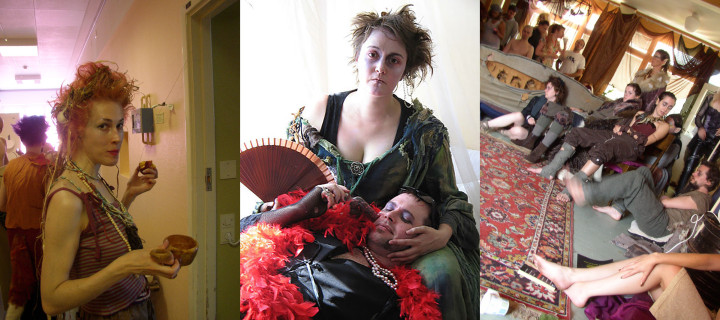 Let me tell you about how you can game master yourself in a larp.
Let me tell you about how you can game master yourself in a larp.
In a tabletop role-playing game it’s easy for the actual game master to work on pacing and theme and mood and so on, because she sees the whole group pretty much all the time, knows what’s happening where, and controls the entire environment.
In a larp that’s much more difficult. You might have run-time game masters, but they probably won’t be able to focus on all the players at the same time. They have to take care of the big picture, the main plot lines, the secret NPCs arriving in time.
So who’s there to take care of your pacing and theme and mood in a larp? That’s right. No one, but you.
Before I tell you about how you can game master yourself, let me tell you about my character.
 I was playing in Sweden, and decided to play only in Finnish. None of the Swedes would understand me, and I would rely on my limited Swedish skills to get what they’re saying. There were a few other Finns in the game, and I could communicate with them, and they could communicate with the others in English or Swedish if they wanted to. But to make things interesting for myself and others, I’d decided to speak only Finnish.
I was playing in Sweden, and decided to play only in Finnish. None of the Swedes would understand me, and I would rely on my limited Swedish skills to get what they’re saying. There were a few other Finns in the game, and I could communicate with them, and they could communicate with the others in English or Swedish if they wanted to. But to make things interesting for myself and others, I’d decided to speak only Finnish.
The game was Moira, a modern-day fairy tale with different sorts of gnomes, trolls and elves from Scandinavian mythology. Faerie courts, Aesir and Vanir, the weavers of fate, changelings, humans no longer believing in the supernatural and so on and so on. There were five mundane modern-day humans in the game, who had been captured in the land of the fairy folk, and their disbelief soon turned to awe and later maybe into fear.
I was one of the vittra, who were sort of the nobility of Nordic critters. There were about a dozen vittra in the game, all mad as hatters, and we had frequent meetings and discussions and debates. Everyone else spoke Swedish, I spoke Finnish, and everyone nodded as if they understood what I was saying. Occasionally Johanna Koljonen, the only vittra who could understand me, repeated some of my comments in Swedish, if she felt it would serve her interests.
 Martin Ericsson was playing one of the humans, a surfer dude clad in bicycle attire, and I started tormenting him for my own pleasure. He didn’t believe in faeries, and wanted me to show him around. I explained things to him, in Finnish. He didn’t understand a word, but I kept explaining. He challenged me and confronted me and attacked me, but I would remain mysterious and inexplicable.
Martin Ericsson was playing one of the humans, a surfer dude clad in bicycle attire, and I started tormenting him for my own pleasure. He didn’t believe in faeries, and wanted me to show him around. I explained things to him, in Finnish. He didn’t understand a word, but I kept explaining. He challenged me and confronted me and attacked me, but I would remain mysterious and inexplicable.
The game went on, and eventually Martin’s character saw too many strange and wonderful things to remain skeptical. He started losing his mind, and I tormented him to make things worse. At one point I stole his bicycle helmet, and that seemed to be the tipping point. He went over the border, and realized everything he’d believed in was false.
Martin’s character started searching for answers, and I kept talking to him in Finnish. If nothing else, he at least wanted his helmet back. He was desperate. Towards the very end of the three-day game, he begged of me to tell him what was going on, to help him, to protect him, to give him back his helmet. He would do anything. Anything! Anything? I asked in Finnish. Anything, he swore in Swedish.
 That’s when I spoke my only line in Swedish. I smiled, and looked deep into his eyes. “Dyrka mig”, I said. Worship me.
That’s when I spoke my only line in Swedish. I smiled, and looked deep into his eyes. “Dyrka mig”, I said. Worship me.
He fell on his knees and bowed his head. My character had gone from zero worshipers to one, and his from a skeptic to a believer. An hour or two after this transformation the game was over.
Years later sitting in a bus in the suburbs of Stockholm, I talked with Martin about larp. I claimed I never thought about the dramaturgy or any external factors like that when playing in a larp. I was in character, and only did what the character would do.
“In that case you must be really, really lucky,” Martin said. For him such great scenes as our final one in Moira, only come through focusing on the drama of the events.
We discussed our views, and I admitted I probably created quite dramatic characters so that I could focus on the drama while staying true to the character.
Of course, the character wouldn’t know when the game is about to end, and when is the perfect moment for final farewells or the romantic first kiss. That’s all me.
 We came to the realization that one must be one’s own game master in a larp. When the game is running, the game master won’t have time to guide us into playing the themes or the moods or the plots or the drama we want. We have to do it ourselves.
We came to the realization that one must be one’s own game master in a larp. When the game is running, the game master won’t have time to guide us into playing the themes or the moods or the plots or the drama we want. We have to do it ourselves.
Whenever we see interesting developments that will enhance our story, our experience and our character immersion, we have to jump at the chance to engage with them. Otherwise we’re not doing anyone any favors.
In a larp you should be your own game master and help your own character immersion by building a better game for yourself.
This article was originally published in the Knudepunkt 2011 companion book Talk Larp – Provocative Writings from KP2011. All photos from Moira and provided by the author. Center of cover photo as well as photo 1, 2 & 4 are by Karin Tidbeck. If you are the copyright owner of the other photos, please contact us.






